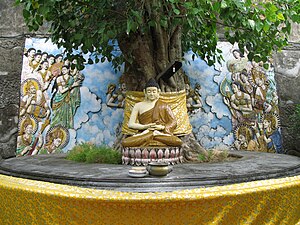Bodhi
Bodhi (T. byang chub བྱང་ཆུབ་; C. puti/jue J. bodai/kaku 菩提/覺) is translated as "awakening," "enlightenment," etc.
Dzigar Kongtrul states:
- Enlightenment (bodhi) is the state of mind of a buddha, one who has awakened to their ultimate potential. It is the most positive state of mind possible—a state of perfect, irreversible happiness and perfect, irreversible freedom from suffering. It is the ultimate state of peaceful heart, from which love flows continually and without impediment.[1]
The Library of Wisdom and Compassion (Vol 3) states:
- Bodhi is generally translated as "awakening" or "enlightenment," the final goal of our spiritual practice. A buddha's awakening is a state in which all defilements of the mind have been abandoned and all excellent qualities and realizations have been completed. The basis for attaining awakening is the essentially pure nature of mind – the natural purity of the mind – which is present in all of us. When the pure nature of the mind is obscured by afflictions (kleshas), we are not awakened; when afflictions, their seeds, and their latencies have been completely purified, we are awakened. Thus awakening has to do with the nature of our minds.[2]
Peter Harvey states:
- At bodhi, there arises ‘vision, knowledge, wisdom, true knowledge, and light’ (S.V.422) and "bodhi" is related to "bujjhati", "understands", in the sense of "rising from the slumber of the continuum of the (moral and spiritual) defilements" (Asl.217). As an ‘awakening’, bodhi is not the awakening of something, that is, a beginning of something, but a final awakening from delusion etc.[3]
A Buddhist Dictionary states:
- bodhi (from verbal root budhi, to awaken, to understand): awakenment, enlightenment, supreme knowledge. “[Through bodhi] one awakens from the slumber or stupor (inflicted upon the mind) by the defilements (kilesa, q.v.) and comprehends the Four Noble Truths (sacca, q.v.)” (Com to MN 10).
- The enlightenment of a Buddha is called sammāsambodhi (q.v.) ‘perfect enlightenment’. The faith (saddhā, q.v.) of a lay follower of the Buddha is described as “he believes in the enlightenment of the Perfect One” (saddahati Tathāgatassa bodhiṃ: MN 53, AN 3:2).
- The components of the state of enlightenment, and contributory factors to its achievement, are mentioned in the texts: the seven factors of enlightenment (bojjhaṅga (q.v.) = bodhi-aṅga) and the thirty-seven ‘things pertaining to enlightenment’ (bodhipakkhiya-dhammā, q.v.). In one of the later books of the Sutta Piṭaka, the Buddhavaṃsa, ten bodhipācana-dhammā are mentioned, i.e., qualities that lead to the ripening of perfect enlightenment; these are the ten perfections (pāramī, q.v.).”
- There is a threefold classification of enlightenment:
- 1. that of a noble disciple (sāvaka-bodhi, q.v.), i.e., of an arahat;
- 2. that of an independently enlightened one (pacceka-bodhi, q.v.); and
- 3. that of a perfect enlightened one (sammā-sambodhi).
- This threefold division, however, is of later origin, and in this form it neither occurs in the canonical texts nor in the older Sutta Commentaries. The closest approximation to it is found in a verse Sutta which is probably of a comparatively later period, the Treasure Store Sutta (Nidhikaṇḍa Sutta) of the Khuddakapatha, where the following three terms are mentioned in stanza 15: sāvaka-pāramī, pacceka-bodhi, buddha-bhūmi (see KhpTr, pp. 247ff.).
- The commentaries (e.g. to M, Buddhavaṃsa, Cariyāpiṭaka) generally give a fourfold explanation of the word bodhi:
- 1. the tree of enlightenment;
- 2. the holy path (ariya-magga);
- 3. Nibbāna; and
- 4. omniscience (of the Buddha: sabbaññutā-ñāṇa).
- As to 2, the commentaries quote Cūla Niddesa where bodhi is defined as the knowledge relating to the four paths (of stream-entry, etc.; catūsu maggesu ñāṇa).
- Neither in the canonical texts nor in the old commentaries is it stated that a follower of the Buddha may choose between the three kinds of enlightenment and aspire either to become a buddha, a pacceka-buddha, or an arahat-disciple. This conception of a choice between three aspirations is, however, frequently found in present-day Theravāda countries, e.g. in Sri Lanka.[4]
In buddha-nature doctrine
In the Tathagatagarbha and Buddha-nature doctrines bodhi becomes equivalent to the universal, natural and pure state of the mind:
Bodhi is the final goal of a Bodhisattva's career [...] Bodhi is pure universal and immediate knowledge, which extends over all time, all universes, all beings and elements, conditioned and unconditioned. It is absolute and identical with Reality and thus it is Tathata. Bodhi is immaculate and non-conceptual, and it, being not an outer object, cannot be understood by discursive thought. It has neither beginning, nor middle nor end and it is indivisible. It is non-dual (advayam) [...] The only possible way to comprehend it is through samadhi by the yogin.[5]
According to these doctrines bodhi is always there within one's mind, but requires the defilements to be removed. This vision is expounded in texts such as the Shurangama Sutra and the Uttaratantra.
See also
Notes
- ↑ Dzigar Kongtrul 2020, Chapter 4.
- ↑ Dalai Lama & Thubten Chodron 2018b, s.v. Chapter 11: Freedom from Cyclic Existence.
- ↑ Harvey 2013, s.v. Chapter 1.
- ↑ Nyanatiloka Thera 2019, s.v. bodhi.
- ↑ Sebastian 2005, p. 274.
Sources
 Dalai Lama; Thubten Chodron (2018b), Saṃsāra, Nirvāṇa, and Buddha Nature, The Library of Wisdom and Compassion, Volume 3, Wisdom Publications
Dalai Lama; Thubten Chodron (2018b), Saṃsāra, Nirvāṇa, and Buddha Nature, The Library of Wisdom and Compassion, Volume 3, Wisdom Publications- Dzigar Kongtrul (2020), Waxman, Joseph, ed., Peaceful Heart: The Buddhist Practice of Patience, Shambhala Publications
 Harvey, Peter (2013), An Introduction to Buddhism (Second ed.), Cambridge University Press
Harvey, Peter (2013), An Introduction to Buddhism (Second ed.), Cambridge University Press Nyanatiloka Thera (2019), Nyanaponika Thera, ed., Buddhist Dictionary: Manual of Buddhist Terms and Doctrines, Pariyatti Publishing
Nyanatiloka Thera (2019), Nyanaponika Thera, ed., Buddhist Dictionary: Manual of Buddhist Terms and Doctrines, Pariyatti Publishing- Sebastian, C.D. (2005), Metaphysics and Mysticism in Mahayana Buddhism, Delhi: Sri Satguru Publications
External links
 Enlightenment, Rangjung Yeshe Wiki
Enlightenment, Rangjung Yeshe Wiki
